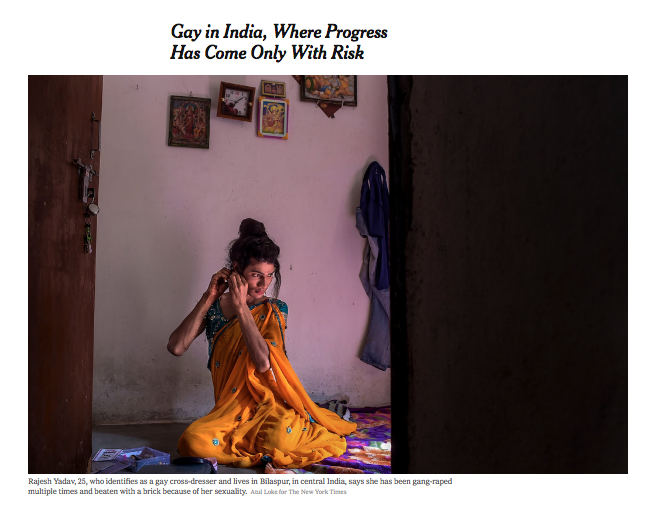 In this article, Kai Schultz, interviews Ayesha Kapur about her experience fighting Section 377, a law that targets LGBTQ individuals, in India. Schultz notes, “gay and transgender Indians from across the country described the cost of living in a country that has forced them to be outlaws: shunning by parents, social isolation, few protections in the workplace, and a frightening vulnerability to both police abuse and sexual assault with limited legal recourse.” This type of behavior and reaction toward LGBTQ Indians is at least partly a consequence of British colonization, wherein the colonizers enforced their morality upon the colonized. “In the 1860s, the British introduced Section 377 of the Indian Penal Code. The law imposed a fine, 10 years’ imprisonment or a life sentence on ‘whoever voluntarily has carnal intercourse against the order of nature.'” Prior to this, the British were already in the process of colonizing Indian bodies, albeit in less outwardly visible ways. The Indian body became a site of abject immorality as the British gained more power over Indian people and control over their resources.
In this article, Kai Schultz, interviews Ayesha Kapur about her experience fighting Section 377, a law that targets LGBTQ individuals, in India. Schultz notes, “gay and transgender Indians from across the country described the cost of living in a country that has forced them to be outlaws: shunning by parents, social isolation, few protections in the workplace, and a frightening vulnerability to both police abuse and sexual assault with limited legal recourse.” This type of behavior and reaction toward LGBTQ Indians is at least partly a consequence of British colonization, wherein the colonizers enforced their morality upon the colonized. “In the 1860s, the British introduced Section 377 of the Indian Penal Code. The law imposed a fine, 10 years’ imprisonment or a life sentence on ‘whoever voluntarily has carnal intercourse against the order of nature.'” Prior to this, the British were already in the process of colonizing Indian bodies, albeit in less outwardly visible ways. The Indian body became a site of abject immorality as the British gained more power over Indian people and control over their resources.
One consideration in how transgender individuals are treated in India today is related to British colonial rule. Prior to colonization, Indian tribes across the continent had accepted a form of gender fluidity whereby a third gender, hijra, was understood as physical representation of various gender-shifting goddesses/gods (i.e., Shiva/Parvati).

Today, however, third gender individuals face a great deal more challenges to their identities and ways of life. While some may experience acceptance at home, from family and friends, a majority experience government sanctioned and community enforced discrimination and violence. The traditional understanding of a third gender’s role in the world has been diminished with colonization and general conservativization of Indian society.